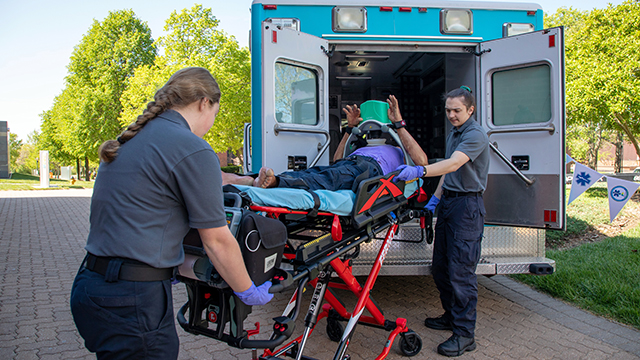This course is approved by the Kansas Board of Regents for guaranteed transfer among all Kansas Regents public postsecondary institutions. Additional courses may also be eligible for transfer. Please visit a JCCC counselor or the JCCC Registrar's office, and the Transfer Kansas portal to learn more.
The primary focus of the Emergency Medical Responder (EMR) is to initiate immediate lifesaving care at the scene of an emergency for ill or injured patients. This individual possesses the basic knowledge and skills necessary to provide lifesaving interventions while awaiting additional EMS response and to assist higher-level personnel at the scene and during transport. Emergency Medical Responders function as part of a comprehensive EMS response, under medical oversight. Emergency Medical Responders perform basic interventions with minimal equipment.
In many communities, Emergency Medical Responders provide a mechanism to increase the likelihood that trained personnel and lifesaving equipment can be rapidly deployed to serious emergencies. In all cases, Emergency Medical Responders are part of a tiered response system. Emergency Medical Responders work alongside other EMS and health care professionals as an integral part of the emergency care team.
The Emergency Medical Responder’s scope of practice includes simple, non-invasive interventions to reduce the morbidity and mortality associated with acute out-of-hospital medical and traumatic emergencies. Emergency care is based on assessment findings. Additionally, the Emergency Medical Responder provides care designed to minimize secondary injury and comfort the patient and family while awaiting additional EMS resources.
Students must earn a grade of “C” or higher in EMS 129 Emergency Medical Responder* to be eligible to receive the JCCC certificate of completion.
(Major Code 3550; CIP Code 51.0810)
Emergency Medical Science Program web page
Program Learning Outcomes
Johnson County Community College (JCCC) is committed to offering high-quality affordable programs that focus on developing knowledge and skills conducive to life-long learning. Both the General Education Student Learning Outcomes and Institutional Learning Outcomes convey JCCC's approach to programmatic outcomes. Additionally, students who successfully complete the Emergency Medical Responder Certificate from JCCC will be able to:
- Recognize medical and trauma emergencies and respond quickly.
- Perform basic life support, including CPR and using an AED.
- Control bleeding and manage shock in emergency situations.
- Protect the airway and support breathing with basic equipment.
- Assess patients for injuries or illness and report findings clearly.
- Work with EMS teams, law enforcement, and other first responders.
- Act professionally, showing respect, responsibility, and ethical behavior.
- Ensure personal safety and the safety of others at emergency scenes.
- Provide emotional support to patients, families, and bystanders.
- Follow local EMS protocols and procedures during emergency care.

